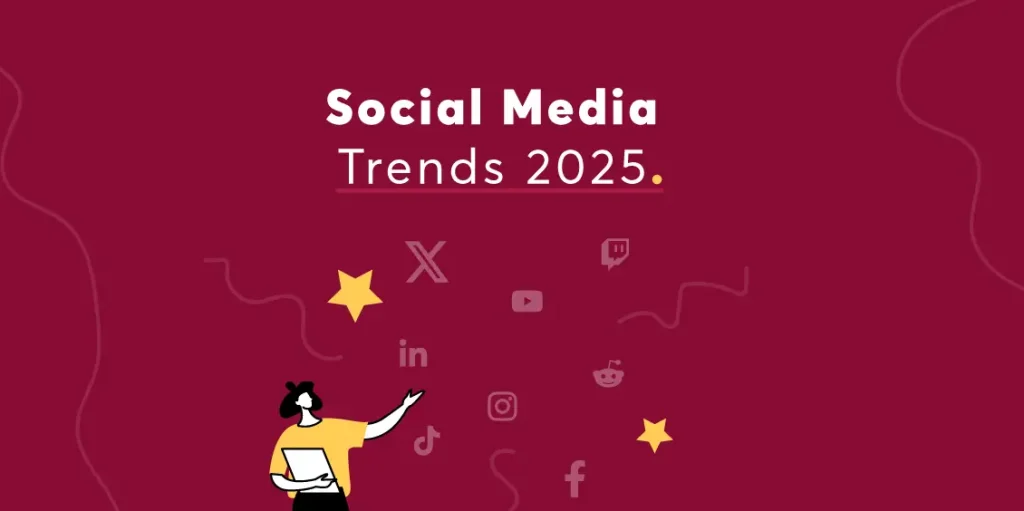
Introduction:
As we step into 2025, social media continues to be an integral part of our daily lives, influencing how we communicate, consume information, and engage with brands. The digital landscape is rapidly evolving, with emerging technologies, changing user behaviors, and new platform features reshaping how businesses and creators interact with audiences. To stay ahead of the curve, it’s crucial to understand the key social media trends guide that will dominate in 2025. This comprehensive guide explores the top trends, helping marketers, influencers, and businesses navigate the future of social media.
1. AI-Powered Content Creation and Curation:
Artificial Intelligence (AI) is already transforming content creation, and by 2025, its impact will be even more pronounced. AI tools are increasingly being used to generate high-quality content with minimal human input. From writing blog posts and social media captions to creating videos and graphic designs, AI will automate and streamline content production processes. Tools like GPT-3 for text generation and DALL·E for image creation are just the beginning. By 2025, these technologies will be more advanced, enabling faster content creation with a higher degree of personalization.
Additionally, AI-driven content curation will play a vital role in enhancing user experience. Social media platforms are already using AI to tailor feeds and recommendations based on individual preferences and behaviors. By 2025, AI will become even more sophisticated, offering hyper-personalized content that resonates deeply with users’ interests and emotional triggers. Businesses and creators can leverage AI to produce more relevant, engaging, and targeted content, helping them stand out in an overcrowded digital space.
2. The Rise of Immersive Experiences (AR/VR):
Augmented Reality (AR) and Virtual Reality (VR) have already begun to take root in social media, but by 2025, these technologies will become mainstream, creating immersive digital experiences. AR filters on platforms like Instagram and Snapchat are just the beginning. In 2025, users will engage in more interactive and personalized experiences using AR, such as virtual try-ons for products, interactive gaming features, and AR-based live events.
On the other hand, VR will allow users to immerse themselves in fully digital worlds. Social media platforms like Facebook (Meta) are already investing heavily in the metaverse, and by 2025, VR-based social networking could become a norm. Imagine attending a virtual concert, participating in live brand experiences, or connecting with friends in a virtual environment. As the hardware for AR and VR becomes more accessible and affordable, businesses and brands will need to incorporate these technologies into their marketing strategies to engage with younger, tech-savvy audiences.
3. The Evolution of Influencer Marketing:
Influencer marketing has seen rapid growth over the past decade, but by 2025, it will evolve into something far more refined and authentic. The influencer landscape will no longer be dominated by mega-celebrities or influencers with millions of followers. Instead, micro and nano-influencers will take center stage, as consumers increasingly value authenticity and relatability.
Additionally, influencers in 2025 will have to demonstrate more than just a large following. They will need to provide real value, whether through expertise, entertaining content, or engaging storytelling. Brands will seek influencers who align closely with their values and have a strong connection with their niche audiences. Trust, transparency, and ethical practices will become critical factors in choosing the right influencer for partnerships.
Furthermore, the integration of AI and data analytics will allow brands to measure the effectiveness of influencer campaigns more accurately. By leveraging data, brands will be able to identify which influencers are driving meaningful engagement, leading to more effective collaborations.
4. Short-Form Video Dominates the Content Landscape:
Short-form video content will continue to reign supreme in 2025. Platforms like TikTok, Instagram Reels, and YouTube Shorts have already established themselves as major players in the content ecosystem, and their dominance will only increase. The short-form video format is highly engaging, digestible, and ideal for the mobile-first generation that prefers quick, snackable content.
In 2025, the power of short-form video will extend beyond entertainment. Educational content, product demonstrations, and behind-the-scenes glimpses will all thrive in short-form formats. Brands and businesses will need to invest in creative video strategies that capture attention in just a few seconds while delivering valuable messages. With social media platforms continually optimizing algorithms to prioritize video content, businesses will need to incorporate video marketing into their digital strategies to stay visible and relevant.
5. Privacy and Data Protection Take Center Stage:
As concerns about data privacy continue to rise, social media platforms will face increasing pressure to implement stricter privacy measures. The implementation of more stringent privacy regulations will be a key trend in 2025. Following the European Union’s General Data Protection Regulation (GDPR) and similar initiatives globally, social platforms will be compelled to provide users with more control over their data.
Additionally, the rise of decentralized platforms and blockchain technology will offer users more transparency and security in how their data is used. In 2025, users may begin to demand greater control over their personal information, and brands that respect this demand will build stronger trust and loyalty with their audiences.
Marketers will also need to adapt their strategies to account for stricter privacy rules. Third-party cookies and cross-platform tracking may become a thing of the past, and businesses will have to rely more on first-party data and permission-based marketing to maintain effective audience engagement.
Conclusion:
The social media trends guide in 2025 presents unparalleled opportunities for innovation and growth. By understanding and adopting these trends, businesses can create impactful strategies that resonate with their audiences and achieve measurable success.
Also Read: Social Media Audience Growth
